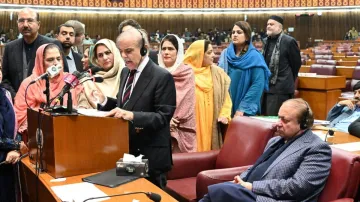Shehbaz Sharif sworn-in as 24th Prime Minister of Pakistan with multiple challenges waiting in queue
The oath ceremony was attended by Nawaz Sharif, Maryam Nawaz and other PML-N workers. PPP’s Murad Ali Shah and Sarfaraz Bugti were also in attendance.

Islamabad: PML-N leader Shehbaz Sharif has been sworn in as the 24th prime minister of Pakistan, Dawn reported. Shehbaz was administered oath by President Arif Alvi at the Aiwan-i-Sadr. The ceremony was attended by Nawaz Sharif, Maryam Nawaz and other PML-N workers. PPP’s Murad Ali Shah and Sarfaraz Bugti were also in attendance.
Who is Shehbaz Sharif?
Shehbaz, known to be an astute politician and a good administrator, was tasked by his elder brother and former three-time prime minister to negotiate with other like-minded parties on the formation of a coalition government. Besides the PPP, Shehbaz was backed by the Muttahida Qaumi Movement (MQM-P), Pakistan Muslim League (Q), Balochistan Awami Party, Pakistan Muslim League (Z), Istehkam-e-Pakistan Party and the National Party.
The new leader should make difficult decisions to undertake to reform the economy of the cash-strapped country and administration. He should also mend ties with its neighbours for peace and stability.
During Shehbaz’s two successive tenures as chief minister of Punjab (2008–2013 and 2013–2018), a network of underpasses, overhead bridges and mass transit systems was introduced in the most populous Punjab province and was completed in record time.
Born in September 1951 in a Punjabi-speaking Kashmiri family in Lahore, Shehbaz did his graduation from the Government College University, Lahore. His family emigrated from Anantnag in Kashmir for business and settled in the village of Jati Umra in Amritsar district, Punjab at the beginning of the 20th century before moving to Pakistan.
Shehbaz Sharif’s first tenure as Prime Minister
Before his stint as prime minister, the younger Sharif was known more as a good administrator than a politician, having served as chief minister thrice in the country's largest province, Punjab. But as prime minister, he quickly took on the role of peacemaker between coalition parties often at odds with one another over key policies. However, under his government, inflation touched a high of 38% with a record depreciation of the rupee currency, mainly due to structural reforms necessitated by the IMF programme to stabilise the country’s economy. He blamed the economic meltdown on his predecessor Imran Khan's government, which he says broke an agreement with the IMF just before he was ousted. He said his government had to introduce a slew of reforms and scrap subsidies, causing inflation to surge.
‘Can-do’ attitude
Sharif, who was born in Lahore to a wealthy Kashmiri-origin family that was in the steel business, started his political career as the Punjab’s Chief Minister in 1997 with a signature “can-do” administrative style. His cabinet members and bureaucrats who have worked closely with him call him a workaholic. As chief minister, he planned and executed a number of ambitious infrastructure mega-projects, including Pakistan's first modern mass transport system in Lahore.
He was caught up in the national political upheaval when his brother was ousted from the premiership by a military coup in 1999 and he went into exile in Saudi Arabia. Shehbaz Sharif entered the national political scene when he became the chief of the PML-N after Nawaz Sharif was found guilty in 2017 on charges of concealing assets related to the Panama Papers revelations.
Married twice, Shehbaz Sharif has two sons and two daughters from his first marriage but none from the second. One of the sons is in politics but the others are not in public life.
The path will be not a 'bed of roses' for Sharif
Pakistan continues to be enmeshed in an economic crisis with inflation remaining high, hovering around 30%, and economic growth slowing to around 2%. Sharif will need to emulate his feat of securing a short-term IMF bailout with the current programme expiring next month and a new extended deal needed to keep Pakistan on a narrow path to recovery. But his main role will be to maintain ties with the military, which has directly or indirectly dominated Pakistan since independence. Unlike his elder brother, who has had a rocky relationship with the military in all his three terms, the younger Sharif is considered more acceptable and compliant by the generals, analysts say.
For several years, the military has denied it interferes in politics. But it has directly intervened to topple civilian governments three times, and no prime minister has finished a full five-year term since the country’s independence. Privatising some lumbering state giants, including the national airline, and securing foreign investment will also be key to ease the economic crisis. The Sharifs have close ties with rulers in Saudi Arabia and Qatar, which could help in securing investments in several projects Pakistan has lately showcased for sale.
Although defence and key foreign policy decisions are largely influenced by the military, Sharif will have to juggle relations with the U.S. and China, both major allies. He is also faced with dealing with fraying ties with three of Pakistan's four neighbours, India, Iran and Afghanistan.